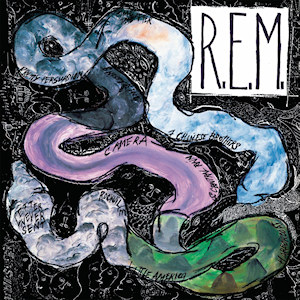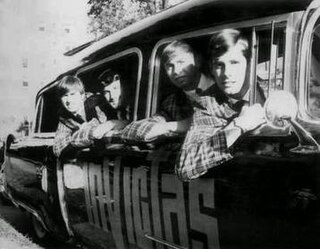Related Research Articles
Garage rock is a raw and energetic style of rock and roll that flourished in the mid-1960s, most notably in the United States and Canada, and has experienced a series of subsequent revivals. The style is characterized by basic chord structures played on electric guitars and other instruments, sometimes distorted through a fuzzbox, as well as often unsophisticated and occasionally aggressive lyrics and delivery. Its name derives from the perception that groups were often made up of young amateurs who rehearsed in the family garage, although many were professional.

Robert Clark Seger is an American singer, songwriter, and musician. As a locally successful Detroit-area artist, he performed and recorded as Bob Seger and the Last Heard and The Bob Seger System throughout the 1960s, breaking through with his first album, Ramblin' Gamblin' Man in 1968. By the early 1970s, he had dropped the 'System' from his recordings and continued to strive for broader success with various other bands. In 1973, he put together the Silver Bullet Band, with a group of Detroit-area musicians, with whom he became most successful on the national level with the album Live Bullet (1976), recorded live with the Silver Bullet Band in 1975 at Cobo Hall in Detroit, Michigan. In 1976, he achieved a national breakout with the studio album Night Moves. On his studio albums, he also worked extensively with the Alabama-based Muscle Shoals Rhythm Section, which appeared on several of Seger's best-selling singles and albums.

Reckoning is the second studio album by American alternative rock band R.E.M., released on April 9, 1984 by I.R.S. Records. Produced by Mitch Easter and Don Dixon, the album was recorded at Reflection Sound Studio in Charlotte, North Carolina, over 16 days in December 1983 and January 1984. Dixon and Easter intended to capture the sound of R.E.M.'s live performances, and used binaural recording on several tracks. Lead singer Michael Stipe dealt with darker subject matter in his lyrics, with water-related imagery being a recurring theme on the album.

Beggars Banquet is the 7th British and 9th American studio album by the English rock band the Rolling Stones, released on 6 December 1968 by Decca Records in the United Kingdom and London Records in the United States. It was the first Rolling Stones album produced by Jimmy Miller, whose production work formed a key aspect of the group's sound throughout the late 1960s and early 1970s.

The Avett Brothers are an American folk rock band from Concord, North Carolina. The band is made up of two brothers, Scott Avett and Seth Avett along with Bob Crawford and Joe Kwon. Mike Marsh (drums), Tania Elizabeth (fiddle) and Bonnie Avett-Rini (piano) are touring members of the band.

Crack the Sky is an American progressive rock band formed in Weirton, West Virginia, in the early 1970s. In 1975, Rolling Stone declared their first album the "debut album of the year", and in 1978, Rolling Stone Record Guide compared them to Steely Dan. Their first three albums charted on the Billboard 200. In 2015, their debut album was ranked number 47 in the Rolling Stone list of "50 Greatest Prog Rock Albums of All Time ". The band continues to release albums and perform to a small but devoted fan base to this day.

Bad Animals is the ninth studio album by American rock band Heart, released on June 6, 1987, by Capitol Records. The album continues the mainstream hard rock style from the band's 1985 self-titled release, all while enjoying similar success. It peaked at number two on the US Billboard 200 in August 1987, and was certified triple platinum by the Recording Industry Association of America (RIAA) on June 4, 1992. Internationally, Bad Animals charted within the top five in Canada, Finland, Norway, Sweden, and Switzerland.

"Surrender" is a single by Cheap Trick released in June 1978 from the album Heaven Tonight. It was the first Cheap Trick single to enter the Billboard Hot 100 chart, peaking at number 62. Its success in Japan, as well as the success of its preceding singles "Clock Strikes Ten" and "I Want You to Want Me", paved the way for Cheap Trick's concerts at Nippon Budokan in Tokyo in April 1978 which were recorded for Cheap Trick at Budokan, the group's most popular album.

The Gentlemen were an American garage rock band from Dallas, Texas, who were active from 1964 to 1968. They are best known for their 1966 song, "It's a Cry'n Shame", which has been recognized as one of the greatest songs in garage rock. The band is noted for the contributions of guitarist and songwriter, Seab Meador. Jimmie Vaughan, later a member the Fabulous Thunderbirds and brother of Stevie Ray Vaughan, served a brief stint for several months in the Gentlemen in late 1965 and early 1966, but did not appear on any of their recordings. He went on to play in another Dallas garage rock band, the Chessmen.
"It's a Cry'n Shame" is a song written by Seab Meador and Mike Kelley and was recorded in 1966 by the Gentlemen, an American garage rock band from Dallas, Texas who were active between 1964 and 1968. It was originally released as the B-side to "You Can't Be True" but has become by far the better-known song. "It's a Cry'n Shame" has been included in several garage rock compilations and is now recognized as one of the greatest songs in the genre.

The Bojax, later known as William Goat, were an American garage rock band from Greenville, South Carolina, who were active from 1964 through 1971. They are best known for the hard-driving protopunk sound exemplified in songs such as "Go Ahead and Go" and "Hippie Times". Although they briefly enjoyed popularity in their own region, they did not gain wider recognition at the until a number of years later when their material would be re-issued on various compilations and anthologies.
The Shy Guys were an American garage rock band from Oak Park, Michigan who were active in the 1960s. They are known for songs such as "We Gotta Go," which became a hit in Detroit and the southern Michigan area, and also in the Buffalo, New York region.

The Invictas are an American garage rock band from Rochester, New York who were active in the 1960s, but re-formed in 2004 and have been intermittently active since. They were one of the most popular local bands in the Rochester scene during the 1960s, scoring a regional hit with "The Hump" in 1965.

The Underdogs were an American garage rock band from Grosse Pointe, Michigan who were active in the 1960s. They became a regular attraction at the Hideout, a club that was an early venue for acts such as Bob Seger, Glenn Frey, and The Pleasure Seekers, featuring Suzi Quatro, and it also served as the home to the Hideout record label, which released several of the Underdogs' singles. The group enjoyed success in the region and came close to breaking nationally with two records released though a joint deal on Reprise Records and then their last on Motown. The Underdogs' work has been included on various garage rock compilations such as the 1998 Nuggets 4-CD box set released on Rhino Records.

The Paragons were an American garage rock band from Charlotte, North Carolina, who were active in the 1960s. They became one of the most popular groups in the Charlotte area during the time and had a major regional hit with the song "Abba", which is now regarded as a garage rock classic. Guitarist Pat Walters later became a member of bands such as The Good the Bad and the Ugly and Jeremiah, as well as the Spongetones.
The Dantes were an American garage rock band from Worthington, Ohio, a suburb outside of Columbus, who were active from 1964–1969. They became one of the biggest groups in the Columbus area, scoring a #1 hit locally with their 1966 song "Can't Get Enough of Your Love", which has become highly regarded by garage rock enthusiasts and collectors.

The Kings Ransom were an American garage rock band from Allentown, Pennsylvania who were active from 1965-1968 and were a popular act in the Lehigh Valley area, as well as around Philadelphia. Their record "Shame" became a hit in Milton, Pennsylvania and received airplay in Michigan. In the intervening years the Kings Ransom's music has come to the attention of garage rock enthusiasts with the release of several of their songs on compilations such as Allentown Anglophile and Teenage Shutdown! Teen Jangler Blowout!

The Kreeg were an American garage rock band from Albuquerque, New Mexico who were active in the 1960s. They were one of the most popular groups in the Albuquerque area and enjoyed local hits from both sides of their 1966 single "How Can I" b/w "Impressin'". Their work has come to the attention of garage rock enthusiasts with the release of the 1996 anthology Impressin', which features their complete recordings.

The Humans were an American garage rock band from Albion, New York who were active in the 1960s. They were popular in the region, touring throughout the Northeast, and enjoyed a regional hit, with the single "Take a Taxi" b/w "Warning", that received airplay in other markets around the country. "Warning" has become especially valued amongst garage rock enthusiasts and was included on the Back from the Grave compilation series.
The Tamrons were an American garage rock band from Concord, North Carolina, near Charlotte who were active in the 1960s. They became one of the most popular bands in Concord and the Charlotte area during the mid-1960s and enjoyed a regional hit with their single, "Wild Man" backed with "Stop, Look, Listen" recorded at Arthur Smith's studio in Charlotte and released on his Pyramid label. They broke up in 1968. In the intervening years their work has become highly regarded by garage rock enthusiasts and has appeared on several compilations.
References
- 1 2 3 Berger & Coston 2014, pp. 29–33.
- 1 2 3 4 5 6 "Garage Band Icon and Novelist, Barry Stachs". Gloucesterboy.com. Retrieved October 18, 2016.
- ↑ "What's New". Daniel Coston Photography. Retrieved October 17, 2016.
- ↑ "Tobacco A Go Go, Volumes 1 and 2". There Was A Time: Rock & Roll In The 1960s In Charlotte, And North Carolina.com. Retrieved October 17, 2016.
- ↑ Berger & Coston 2014, pp. 29–30.
- 1 2 3 Markesich 2012, p. 122.
- ↑ Berger & Coston 2014, p. 29.
- 1 2 3 4 5 6 7 8 Berger & Coston 2014, p. 30.
- 1 2 Berger & Coston 2014, pp. 31–32.
- ↑ Berger & Coston 2014, p. 32.
- 1 2 3 Berger & Coston 2014, p. 90.
- 1 2 3 4 5 Berger & Coston 2014, p. 91.
- ↑ Berger & Coston 2014, p. 90-91.